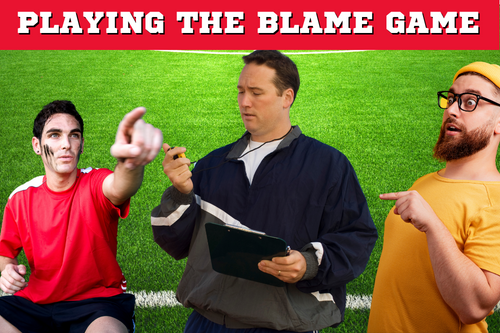Do you play the “blame game” when things don’t go as planned according to your performance?
If you lose a game, make a critical mistake, score poorly or drop a sitter, do you blame someone else for the mistake?
How many times have you heard athletes or teammates say:
“If my teammates didn’t fail, we would have won” or “My coach doesn’t like me and doesn’t pay attention to me in practice” of “If the referees didn’t make such a bad decision,” or “My parents are putting too much pressure on me?”
A big problem arises when you get caught up in the blame game.
If you feel that your coaches, teammates, officials, or parents are causing you to underperform, you might actually be saying that the only way you can do better is to change them.
The nature of the blame game is that you have no control over your actions – other factors will determine your success or failure. When you really think about it, all you are doing is conveniently minimizing your contribution to your own performance.
This mindset is:
No matter how hard you try, your results ultimately depend on other people or factors beyond your control. The opposite of this mindset is taking responsibility for your results.
Of course, there are situations that are out of your control like the amount of playing time, weather and injuries, but most of your results are within your control, and that is how you should want it to be.
When you take personal responsibility for your own success, you can improve your performance, consistency, and attitude.
People who take personal responsibility will work harder in practice. They will pay more attention to the little things that can greatly affect their performance. They will also work harder to improve their technique.
You’ll have a more positive attitude and feel confident and in control during the game.
Even some professionals shy away from responsibility, and this lack of accountability often lands them in the trap of underperformance.
Novak Djokovic was ranked No.1 in the ATP Rankings for a record 223 weeks and appeared to be invincible. However that all changed when he lost in the first round of the Rio Olympics and lost the 2016 US Open Final. He lost his No.1 ranking and his performances started to decline.
Djokovic has two options:
1.Take responsibility for his performances and look to improve
- Blame someone else.
Unfortunately, he chose to fire his team, the trainer, fitness trainer and physiotherapist, even though they had helped him win 12 Grand Slam titles wins previously.
Djokovic’s search should have been internal. How can I improve my performance? Ultimately, you control your health, not the fitness trainer. You control the technique, not the coach. While having a strong support team and good coach is important, getting the job done is up to you.
When you take personal responsibility for your performance, you can regain control.
Techniques for Controlling Performance First:
- Avoid pointing fingers and blaming other people or factors for failure.
- When evaluating your match results, objectively look for 1-2 ways you could improve your performance.
When you develop the habit of taking personal responsibility, you empower yourself and feel more motivated to find ways to improve your game.





